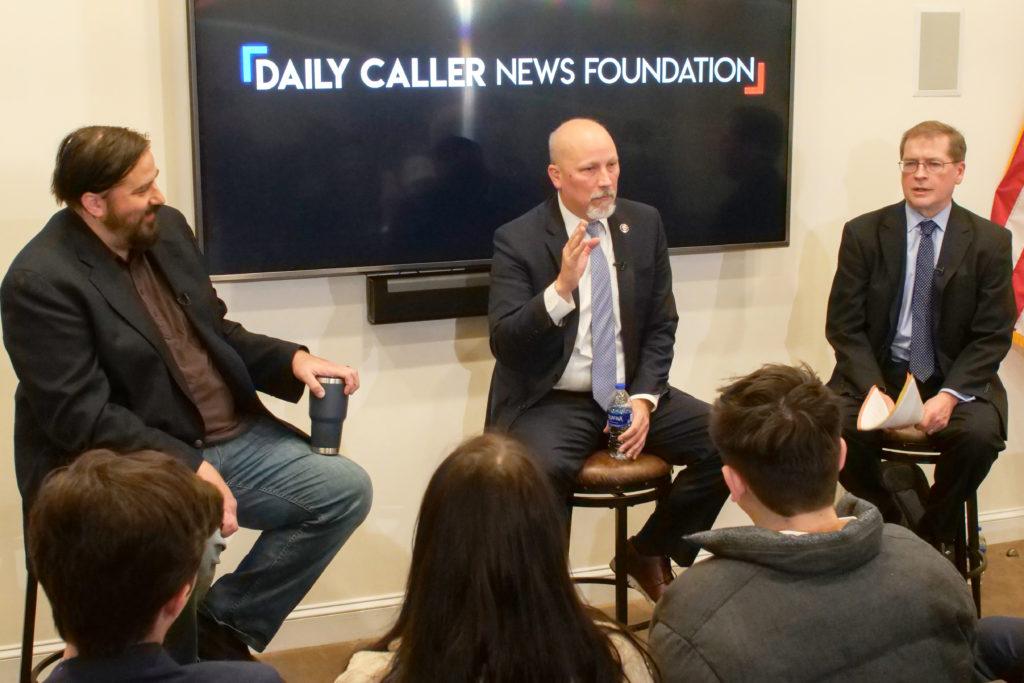Two prominent conservatives discussed the current state and future of the Republican Party before about 20 students at the Conservative Partnership Institute Headquarters Building Wednesday.
A Texas congressman and the president of Americans for Tax Reform – a conservative advocacy group – discussed the Republican Party’s appeal and current challenges that factor into its developing platform ahead of the upcoming November general elections. GW College Republicans hosted the event alongside the Daily Caller News Foundation and the Conservative Partnership Institute, a conservative nonprofit, and Derek Hunter – a columnist for Townhall, a conservative news website – moderated the debate.
Rep. Chip Roy, R-Texas, said he is concerned about political bias within media organizations and called One America News and Newsmax more accurate news sources, despite criticism for their right-wing leanings. He said many media organizations have a bias against conservative policies, and he encouraged Republicans to use their time with the press and in Congress to speak directly to their constituents.
He said they should invoke antitrust legislation against media conglomerates that force them to divest some of their holdings and stop collaborating.
“Our job is to get the truth out there, as a member of Congress to use those multiple channels, look at the laws of what we can do,” he said. “But I don’t love sticking to government – my automatic reaction isn’t to have the government jump in, I think we have to look at these things to make sure there’s competition.”
Roy said the government should cut the federal budget by $1 trillion and cut “nonmandatory” spending, like education and law enforcement programs. He said federal officials should reduce budgets of government agencies like the Department of Homeland Security, the Bureau of Alcohol, Tobacco, Firearms and Explosives and the Department of Education, which administers student loan programs.
“Do away with all the civil service nonsense and allow people to come in here and fire all of these bureaucrats, clean house and return the power to the people in the states,” he said.
Roy said Republicans failed to fulfill promises made to voters to reduce the federal debt, increase border security and deregulate the healthcare industry in 2017.
Roy said he does not favor eliminating the Affordable Care Act but prefers eliminating controls on drugs and giving Medicare patients more options for their health providers to deregulate the healthcare industry. He said he was forced to change his own doctor from MD Anderson Cancer Center after he was diagnosed with Hodgkin lymphoma in 2011 because of restrictions on his government-supplied health care plan.
“As a member of the United States Congress, I am on Obamacare, and as a cancer survivor, I was prohibited on my Obamacare plan from being able to go back to MD Anderson, where I was able to get care a decade ago,” he said. “That is horse manure – that is absolutely wrong.”
Roy said his next reelection campaign will aim to increase border security, expand parents’ influence in their children’s classrooms, increase military strength and counter China economically and diplomatically, similar to the relationship between the U.S. and Soviet Union during the Cold War.
“Right now we have one simple goal, and that is to go speak to the American people with a vision of where to take them,” he said. “And then we’ll have time to figure out leadership when we get to it this fall.”
Grover Norquist, the president of Americans for Tax Reform, said the Republican Party should focus on pushing legislation that would reform the tax code, criminal justice and social welfare similar to the party’s agenda during the mid-1990s, called the “Contract with America.” He said passing thoroughly vetted and policy-oriented legislation gave party members “credibility.”
“When I went into the meeting, where we’re going to put together this ‘Contract with America,’ I had my list – our wish list of all the right-wing things that we wanted,” he said. “And I said no, this is a list of bills that have been introduced by Republicans, that Democrats have refused to even allow a vote on – so what was interesting was the level of credibility, that these were actual pieces of legislation.”
Norquist said Republican presidents should consider suspending civil servants’ rights to unionize to shrink the size of the federal bureaucracy. He said labor unions can harm federal agencies related to national security and defense, like the Department of Veterans Affairs or Transportation Security Administration.
“That’s why you saw people in the Veterans Administration who made mistakes that cause people to be badly damaged and die, fired under civil service rules and then rehired under the Union,” he said.
Norquist said the modern Republican Party ideology should center around the idea of a “limited government,” including scaling back federal income taxes and introducing school choice voucher programs, which give students enrolled in public schools funds to study in private schools. He said party leaders should put more attention to local and state-level races, instead of national elections.
“2010 and 2014 were years of sweeps at the state level, as well as doing well in the House and the Senate and I just in general, the interesting ideas that are coming out of state legislatures, governors and that in various states are being implemented in working,” he said. “That’s where the federal laws of the future are coming from.”







